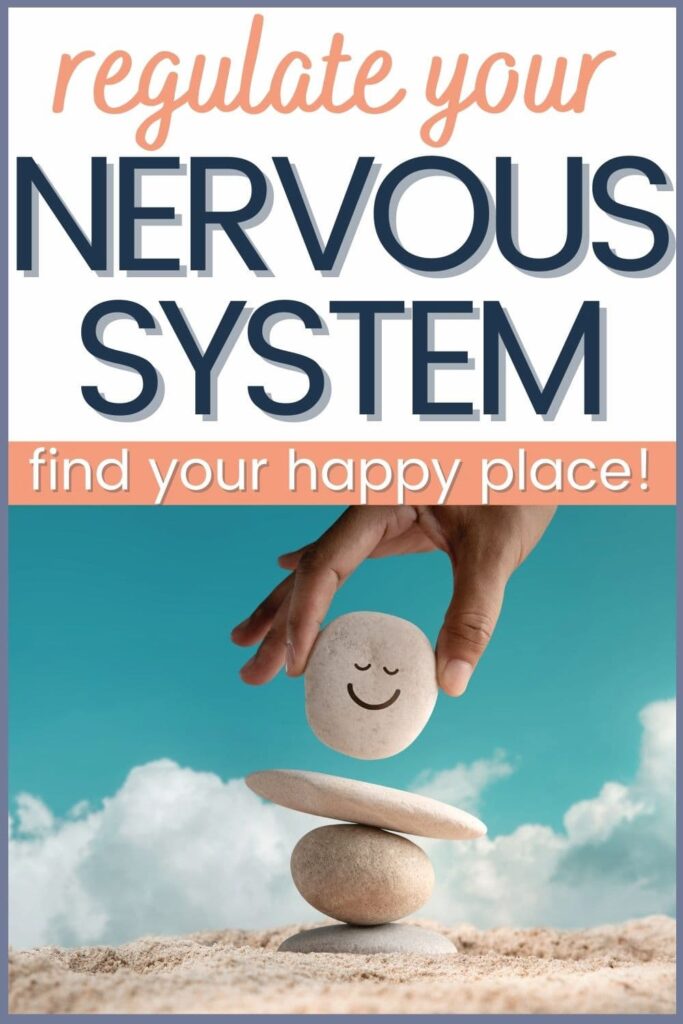Discover the power of healing your nervous system through simple, natural techniques designed to help you shift from spending excessive time in fight or flight mode to experiencing more moments of rest and relaxation.
In this article, we’ll delve into the remarkable connection between your mind, body, and environment, and reveal how an imbalanced nervous system can impact your physical, emotional, and mental well-being.
Come along as we venture into the realm of soothing herbs, energy healing, and the marvels of stimulating your vagus nerve, all while underscoring the significance of a natural and holistic approach to maintaining a healthy nervous system.
Prepare for a transformative journey toward a harmonious and lively life, brimming with love, laughter, and authentic happiness.

The Importance of Nervous System Health
Our nervous system, consisting of the central nervous system (CNS) and the peripheral nervous system (PNS), serves as a crucial communication network within our bodies.
It governs bodily movements, sensory experiences, and the regulation of internal organs like the brain, digestive tract, and immune system.
Maintaining nervous system health is essential for overall well-being since a dysregulated nervous system can result in a multitude of physical, emotional, and cognitive symptoms.
Embracing a Natural and Holistic Approach to Healing
Given the profound connection between the mind, body, and environment, it’s evident that nurturing our nervous system requires a comprehensive and natural strategy.
Conventional methods may not offer long-lasting relief, as they typically focus on treating individual symptoms instead of addressing the root causes of nervous system dysregulation.
In contrast, a holistic approach takes into account the intricate relationship between our mental, emotional, and physical states, as well as the influence of external factors like stressors and lifestyle choices.
By adopting a natural and holistic path to healing, you can more effectively support your nervous system’s recovery and overall health, paving the way for a balanced and thriving life.

Why a Natural and Holistic Approach to Nervous System Healing is Essential
The Interconnectedness of the Mind, Body, and Environment
One of the core principles of holistic healing is the recognition that the mind, body, and environment are deeply interconnected.
Our mental and emotional states can significantly impact our physical health, and our environment plays a crucial role in shaping our well-being.
By embracing this interconnectedness, a holistic approach to nervous system healing addresses the whole person and the various factors that contribute to nervous system dysregulation, leading to more sustainable and lasting results.
The Shortcomings of Conventional Approaches to Nervous System Healing
Conventional approaches to nervous system healing often focus on treating individual symptoms or specific aspects of dysfunction through medication or invasive procedures.
While these methods can provide temporary relief, they may not address the root causes of the problem or take into account the mind-body-environment connection.
This can result in a fragmented healing process that fails to provide long-term solutions and may lead to dependence on medications or treatments.
The Benefits of a Holistic Approach
A natural and holistic approach to nervous system healing offers numerous benefits over conventional methods.
This empowers individuals to make informed decisions about their healing journey and adopt lasting lifestyle changes that support long-term health and well-being.
Additionally, holistic healing methods often work in harmony with the body’s innate healing capabilities, reducing the risk of side effects and fostering a greater sense of overall wellness.
By gently supporting the nervous system and encouraging the body to restore balance from within, holistic healing can lead to lasting improvements in both physical and emotional health.

Symptoms Of Nervous System Dysfunction
Physical Symptoms
Dysfunction in the nervous system can manifest in various physical symptoms, which can range from mild to severe.
Some of the most common physical symptoms include:
- Chronic pain or tension in muscles and joints
- Headaches or migraines
- Fatigue and low energy levels
- Sleep disturbances, such as insomnia or excessive sleepiness
- Digestive issues, such as irritable bowel syndrome or slowed motility
- Changes in weight, including unexplained weight gain or loss
- Sensitivity to temperature, light, or sound
- Impaired coordination or balance
- Muscular weakness or stiffness
Emotional Symptoms
Emotional symptoms of nervous system dysfunction can have a significant impact on an individual’s mental well-being and overall quality of life.
Some common emotional symptoms include:
- Anxiety or persistent worry
- Depression or feelings of sadness
- Mood swings or irritability
- Emotional numbness or detachment
- Difficulty managing stress or coping with daily challenges
- A heightened sense of fear or hypervigilance
Cognitive Symptoms
Cognitive symptoms can also arise from nervous system dysfunction, affecting an individual’s ability to think, process information, and make decisions. Common cognitive symptoms include:
- Difficulty concentrating or focusing
- Memory problems or forgetfulness
- Confusion or disorientation
- Slowed thinking or difficulty processing information
- Impaired decision-making or problem-solving abilities
It is essential to recognize that these symptoms can vary greatly among individuals and can be influenced by factors such as the severity of the dysfunction, underlying causes, and personal circumstances. Addressing these symptoms through holistic nervous system healing can help restore balance and improve overall well-being.

Why Nervous System Healing Should Precede Detox, Fasting, or Extreme Therapies
The Importance of a Stable Nervous System for Overall Health
Before starting any detox, fasting, or extreme therapies, it is essential that your nervous system is functioning optimally.
A stable nervous system serves as the foundation for overall health and well-being, enabling the body to adapt and respond effectively to various challenges and stressors.
When the nervous system is balanced and functioning properly, the body is better equipped to handle the demands and potential side effects of detoxification, fasting, or extreme therapies.
But, if the nervous system is dysregulated or imbalanced, these practices can exacerbate existing issues or even create new problems, hindering the healing process and potentially causing further setbacks.
The Risks Associated with Detox, Fasting, or Extreme Therapies Without Addressing Nervous System Dysfunction
Detoxification, fasting, and extreme therapies can place significant stress on the body and digestive system, particularly if the nervous system is not functioning optimally.
Some of the risks associated with undertaking these practices without addressing nervous system dysfunction include:
- Increased stress on the body: Detox, fasting, or extreme therapies can cause a temporary increase in stress hormones, potentially exacerbating existing nervous system imbalances and impeding the healing process.
- Adverse reactions: Without a stable nervous system, the body may struggle to cope with the demands of detoxification, fasting, or extreme therapies, leading to adverse reactions or complications.
- Worsening of symptoms: Nervous system dysfunction can amplify the intensity or duration of detox, fasting, or extreme therapy side effects, resulting in a worsening of existing symptoms or the development of new issues.
- Incomplete healing: Failing to address the root causes of nervous system dysfunction before embarking on detox, fasting, or extreme therapies can result in incomplete healing or recurring problems, undermining the overall effectiveness of these practices.
For these reasons, it is essential to prioritize nervous system healing before engaging in detoxification, fasting, or extreme therapies.
By first restoring balance and stability to the nervous system, you create a solid foundation for overall health and well-being, paving the way for more successful and sustainable healing outcomes.

Gentle, Natural Ways to Heal Nervous System Dysfunction
Rest (And More Rest!)
Prioritizing rest and sleep is essential to function properly. Resting as much as possible and getting good, restorative sleep is healing for the mind as well as the physical body as it allows the body to repair and regenerate while reducing stress. Aim for 7-9 hours of quality sleep each night and practice good sleep hygiene to support a healthy sleep-wake cycle.
Create Safety In Your Body
Creating a sense of safety within our bodies is very healing to the nervous system. This can involve incorporating mindfulness practices, deep breathing exercises, and grounding techniques to help calm the sympathetic nervous system and activate the parasympathetic nervous system, which is the nervous system responsible most for rest and relaxation.
Learn To Surrender And Be In The Moment
Nervous system healing takes time and requires patience. Be gentle with yourself and remember that true healing is a gradual process that unfolds over time.
Correct Nutrient Deficiencies
Limiting refined sugar and carbs while incorporating healthy protein, mineral-rich foods, and healthy fats can support healthy blood pressure and blood sugar levels, provide essential nutrients, and nourish the whole body.
Interested in learning more about your personal mineral levels? Consider a hair analysis!
Homeopathic Remedies
These remedies can help support a dysregulated nervous system by addressing the underlying imbalances that contribute to dysfunction.
Some common homeopathic remedies for nervous system support include:
- Aconitum napellus: This remedy is often recommended for individuals experiencing acute anxiety or panic attacks, as it can help reduce high-stress feelings.
- Hypericum perforatum: Also known as St. John’s Wort, this remedy can help alleviate nerve pain and support overall health.
- Gelsemium sempervirens: This remedy is often used to address symptoms of nervous system dysfunction related to stress, such as headaches, dizziness, and muscle tension.
- Ignatia amara: This remedy can help address emotional symptoms such as grief, anxiety, or mood swings.
Nervine Herbs
Nervine herbs can help soothe and support the nervous system:
- Skullcap: This herb helps to calm an overactive nervous system and promote relaxation.
- Hops: Hops can alleviate tension and support restful sleep.
- Oatstraw: Oatstraw infusions nourish the nervous system and can help reduce anxiety and stress.
- Catnip: Catnip has a calming effect on the nervous system and can promote relaxation.
- Chamomile: This herb is well-known for its calming properties and can help reduce stress and anxiety.
Intensive Therapies
Some individuals may benefit from more intensive therapies, such as:
- DNRS (Dynamic Neural Retraining System): A brain retraining program that helps rewire neural pathways to reduce symptoms associated with nervous system dysfunction.
- Gupta Program: A clinically proven holistic healing approach that addresses the root causes of chronic conditions, including nervous system dysfunction, through a combination of cognitive, behavioral, and mindfulness techniques.
- Trauma Healing Accelerated: A comprehensive program that addresses the emotional and psychological aspects of trauma, which can contribute to nervous system dysfunction. Dr. Apigian understands childhood trauma on a personal level and not only gives helpful information about how the nervous system works including the states of fight or flight (as well as freeze), but also provides practical tools to help if you find yourself in a stress response.

Bodywork Therapies
Various forms of bodywork can support nervous system healing:
- Myofascial Release: This technique helps to release muscular tension and promote relaxation.
- Massage: Massage can help to reduce stress, alleviate tension, and improve circulation.
- Somatic Healing: Somatic movement and breathing exercises can help release stored trauma and rebalance the nervous system.
Energy Healing Practices
Energy healing practices, such as Body Code or Emotion Code, Reiki, and acupuncture, can help to balance the body’s energy systems and support nervous system health.
Stress Reduction Techiques
Incorporating stress reduction techniques, like deep breathing exercises, yoga, or meditation, can help to calm the sympathetic nervous system and support overall nervous system health.
Embrace Joyful Connections
Surrounding yourself with love, laughter, and positive experiences reduces stress and can support healing and well-being by stimulating the release of feel-good hormones and promoting a sense of connection and belonging.
Make Changes To Create Your Authentic Life
Evaluating and making necessary changes in various aspects of your life can contribute to genuine happiness and support nervous system healing:
- Happiness at work: Assess your career satisfaction and consider making changes if needed to improve your overall happiness and reduce stress levels.
- Family and friends: Evaluate the quality of your relationships and address any toxic or unhealthy connections that may be impacting your nervous system health.
- Safety at home: Assess your living environment and make necessary changes to ensure you feel safe and supported, as this can significantly influence your nervous system’s ability to heal.
Connection To A Higher Power
Prayer and spiritual practices can be valuable additions to nervous system healing, as they provide numerous benefits.
These practices foster relaxation, stress relief, and a sense of connection to a greater purpose.
By engaging in activities such as prayer, meditation, mindfulness, or spending time in nature, you can calm your mind and soothe your nervous system.
Cultivating a deeper connection to your spiritual beliefs or values enhances resilience and inner strength, contributing to overall nervous system balance and well-being.

FAQs About Healing Your Nervous System
1. Can exercise play a role in nervous system healing?
Exercise can definitely contribute to nervous system healing.
Regular physical activity can help reduce stress, release endorphins, and improve blood circulation, all of which can support a healthy mind and body.
It’s essential to choose activities that are appropriate for your health and fitness level and that you actually like to do. Remember- you want to nourish and love your body, not kill yourself slowly with heavy workouts that you hate.
2. Are there any specific dietary recommendations for nervous system healing?
In addition to consuming healthy fats, as mentioned above, a balanced diet rich in fruits, vegetables, healthy carbs, lean protein, and no refined sugar is a good general recommendation. Some nutrients and minerals, such as B vitamins, calcium, magnesium, sodium, and potassium are particularly important for nervous system function.
This is where hair analysis shines and why I routinely recommend it to my clients! With a small amount of hair, you can get personalized food and supplement recommendations based on your individual needs.
3. Can supplements play a role in nervous system healing?
Supplements can absolutely play a role in managing symptoms or addressing specific issues. However, it’s important to address the root causes of dysfunction and implement healing strategies.
I personally think a temporary and targeted use of supplements can be quite helpful in certain situations, but only in addition to a well-rounded protocol that addresses all other elements of healing.
4. How can I track my progress in nervous system healing?
Tracking your progress can be as simple as keeping a journal to document your symptoms, lifestyle changes, and improvements over time.
You may also consider working with a practitioner who can help make adjustments to your healing plan as needed.
5. How long does it typically take to heal a dysfunctional nervous system?
The healing process is unique to each individual and can be influenced by various factors, including the severity of dysfunction, underlying causes, and the effectiveness of the healing strategies implemented.
While some people may notice improvements within weeks or months, others may require a more extended period to experience lasting changes.
Patience and consistency are key when working toward nervous system healing.

Healthy Nervous Systems = Healthy Life
Adopting a nourishing and restorative approach to nervous system healing presents a promising avenue for enhancing our overall well-being.
By incorporating nutrient-rich diets, engaging in regular exercise, managing stress, and prioritizing quality sleep, we can significantly improve our nervous system’s ability to recover and maintain optimal function.
As research in this field continues to expand, it is becoming increasingly clear that a holistic approach to healing, one that considers the intricate connection between our body, mind, and environment, is essential to achieving optimal health.
By embracing these principles and incorporating them into our daily lives, we can pave the way for a healthier, more resilient nervous system and a brighter future.
Related Articles
- Unlocking The Secrets Of Nervous System Regulation For Optimal Health
- Brain Retraining and Neuroplasticity: Unlocking the Mind-Body Connection to Heal
- Breathe Your Way to Healing: Unveiling the Power of Somatic Breathwork
- Discover the Power of Somatic Movement for Healing Trauma and Stress
- Embracing Surrender: A Journey to Peace
- Easy Ways To Reduce Stress Naturally
- Delicious Adaptogenic Tea Blends For Balance And Stress Relief


